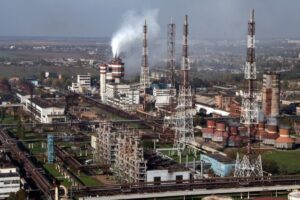
The Interdepartmental Commission on International Trade (ICMT) of Ukraine established the facts of discriminatory and unfriendly actions on the part of Belarus against Ukrainian automotive enterprises and applied adequate measures, deciding to introduce a special duty on the import of buses, trucks and special vehicles from Belarus in the amount of 35% of customs value.
“The special duty is applied… until the fact of the cessation of discriminatory and unfriendly actions against Ukraine by the Republic of Belarus is established,” the Commission said in a statement in the Uriadovy Kurier newspaper on Thursday.
According to it, the decision of the ICMT on the introduction of the special duty comes into force 10 days from the date of publication.
According to the report, based on the results of consideration of materials submitted by the Ministry for Development of Economy, Trade and Agriculture of Ukraine, it was established that the government of Belarus has created artificial barriers in relation to wheeled vehicles imported from Ukraine in the form of a recycling fee and unequal conditions for participation in public procurement, as a result of which it becomes more complicated to enter the Belarusian market for Ukrainian enterprises.
“Such actions of the Republic of Belarus contradict the Articles of the Agreement on the Free Trade Area (CIS) dated October 18, 2011, the Articles of the Agreement between the Government of Ukraine and the Government of the Republic of Belarus on Free Trade dated December 17, 1992 and are considered discriminatory and unfriendly,” the ICMT said in the statement.
The special duty is imposed on the import of new buses to Ukraine classified according to codes of the Ukrainian Classifier of Goods for Foreign Economic Activity 8702 10 11 10, 8702 10 11 30, 8702 10 91 00, 8702 20 10 10, 8702 20 10 90, 8702 20 90 00, 8702 30 10 00, 8702 30 90 00, 8702 40 00 10, 8702 40 00 90, 8702 90 11 00, 8702 90 31 00, 8702 90 90 00.
With regard to trucks, the duty is introduced on new diesel and semi-diesel vehicles with a gross weight of more than 5 tonnes, but no more than 20 tonnes, and a total weight of more than 20 tonnes (except for chassis with a cab), classified according to codes 8704 22 91 00 and 8704 23 91.
Also, the 35% special duty will be imposed on the import of some special vehicles: trucks for emergency repairs, truck cranes, road sweepers, watering machines, workshop vehicles, hydraulic lifts classified according to codes 8705 10 00 00 and 8705 90 80 90.
According to the State Customs Service, in 2020, under general code 8702 (motor vehicles for transporting more than 10 people, including a driver), buses worth $38 million (60% of total imports) were imported to Ukraine from Belarus, with no exports at all.
Trucks with a gross weight of 5-20 tonnes from Belarus were imported for $10.4 million, over 20 tonnes – for $34.13 million (there was no export), special vehicles under classifier code 8705 10 00 00 – for $4 million (there was no export from Ukraine), under code 8705 90 80 90 – for $5.76 million (exported for $0.05 million).
As reported, the Ministry of Economy launched an investigation into the facts of discriminatory actions on the part of the Republic of Belarus regarding the legal rights and interests of Ukrainian automotive enterprises at the request of the Ukrautoprom association.

Kernel, one of the largest Ukrainian agrarian groups, in the third quarter of fiscal year 2021 (FY, began in July 2020), reduced sales of sunflower oil by 2% compared to the same period in the previous FY, to 371,920 tonnes.
According to a report posted on the company’s website on Friday, the share of bottled oil of total sales was 10% (37,000 tonnes).
Kernel processed 902,000 tonnes of oilseeds in Q3 FY2021, down 4% y-o-y due to the low harvest of sunflower seeds in Ukraine this season.
According to the report, grain export volume from Ukraine in January-March 2021 dropped 15% y-o-y, to 1.8 million tonnes, of which 1.3 million tonnes had been originated from external suppliers and the remaining had been produced by company’s farming division. Slowdown in the grain export volume was caused mostly by a substantial grain harvest reduction this season in Ukraine (including company’s farming operations) and the respective decline of the exportable grain surplus for the country.
The company’s export terminal throughput volume in Ukraine increased to 2.1 million tonnes in Q3 FY2021, up 6% y-o-y. Transshipment volume exceeded the grain export volume from Ukraine, as the company substantially increased the scale of sunflower meal transshipment operations on its terminals in Chornomorsk, with such goods being exported through third-party terminals before.
The holding cut grain and oilseeds received in inland silos by 12% in Q3 FY2021, to 109,021 tonnes.

TAS Insurance Group (Kyiv) in January-March 2021 attracted UAH 590.18 million in premiums, which is UAH 111.98 million, or 28.4% more compared to the reporting period of 2020.
According to the website of the insurance group, the first place in the company’s portfolio with a share of 29.05% was taken by OSAGO, which attracted UAH 171.45 million of insurance premiums, which is 9% more than the corresponding figure for January-March 2020.
Under voluntary medical insurance contracts, TAS Insurance Group attracted UAH 123.68 million in premiums for the first quarter, which is 20.96% of the insurer’s total receipts, and is 60.1% higher than the indicated figure for the three months of last year.
The share of KASKO in the company’s portfolio amounted to 20.14% with UAH 118.89 million of premiums, which is 32% more than a year ago.
The volume of receipts of the insurer under Green Card policies in January-March 2021 amounted to UAH 94.36 million, its share in the insurer’s portfolio reached 15.99%, and the volume is 15.1% higher than the corresponding figure for the reporting period last year.
Under property insurance contracts, the company attracted UAH 18.44 million in January-March. Under other insurance contracts, TAS Insurance Group collected UAH 63.36 million of insurance premiums in the first quarter.

Prime Minister of Ukraine Denys Shmyhal instructed to work out ways to enhance tourism between Ukraine and Turkey.
“Ukrainians are on the list of numerous tourists in Turkey, and the geography of their rest is constantly expanding. Therefore, we must consider the possibility of expanding communication, including organizing additional flights on popular routes at weekends, as well as opening communication with new cities,” the governmental press service said, citing Shmyhal.
The prime minister also said that favorable conditions should be developed to attract tourists from Turkey to Ukraine.
“In addition to large cities, it is worth considering the possibility of developing directions to sanatorium resorts that will be interesting for traveling with the whole family,” he said.
For his part, Ambassador of Ukraine to Turkey Andrii Sybiha said the Ukrainian cities of Kamianets-Podilsky and Khotyn may be interesting for tourists from Turkey.
The meeting participants also discussed the possibility of mutual recognition between Ukraine and Turkey of future health certificates that are being developed in the European Union, which will help significantly increase the flow of tourists between states during a pandemic.
“Following the meeting, Denys Shmyhal instructed the relevant departments to study the issue of the possibility of increasing regular and charter flights between Ukraine and Turkey and consider ways to simplify the system of visiting Ukraine by vaccinated Turkish citizens,” the ministry said.

Valki-Ilmenite and Mezhdurechensk Mining and Concentration Complexes, part of the titanium business of Group DF, in January-March this year, according to preliminary data, reduced the production of ilmenite concentrate (titanium dioxide concentrate) by 11.9% in compared to the same period last year, to 31,000 tonnes from 35,200 tonnes.
According to the group’s press release on Monday, Group DF analysts expect a recovery in demand for titanium products in global markets only from mid-2022, so complexes will increase production according to demand.
Chairman of the boards of Valki-Ilmenite LLC and Mezhdurechensk LLC Serhiy Kosenko, who is cited by the press service, said that the production plans are fully fulfilled and all deliveries of products are carried out in accordance with the concluded contracts.
“The reduction in production was due to a change in the market situation – a global decrease in demand for titanium products. This was not a reason to curtail the large-scale investment program launched at the plants. In 2021, the shareholder has already invested more than UAH 31 million in two mining and processing complexes. We continue the planned renewal of fixed assets: new mining and transport equipment is being purchased, modernization, repairs and renewals of old assets are being carried out. Our strategy is aimed at increasing production efficiency, improving cost indicators and increasing the margin of the business as a whole,” the press service said, citing Kosenko.
Kosenko noted that analysts of the company expect a recovery in demand for titanium products at pre-crisis levels only from mid-2022.
“This is an optimistic scenario. Now, when the global market is undergoing a significant shrinkage, our task is to prepare for future growth. Therefore, we are actively updating our equipment and began conducting mining preparatory work to move to new production areas,” the top manager said.
The press release also said that as part of Group DF’s titanium business development strategy, the shareholder continues to invest in the construction of two more new plants: Stremyhorod (Zhytomyr region) and Motronivsky (Dnipropetrovsk region) Mining and Concentration Complexes.
About $150 million have already been invested in the Motronivsky plant project. The planned design capacity of the enterprise is estimated at 120,000 tonnes of ilmenite concentrate, 14,000 tonnes of zirconium and 20,000 tonnes of rutile concentrate.
Investments in the Stremyhorod plant project exceeded UAH 100 million. At the moment, design and survey work is being carried out. After the implementation of the first phase, the design capacity of the plant will be about 500,000 tonnes annually of ilmenite concentrate and 150,000-200,000 tonnes annually of apatite concentrate.
Group DF combines the assets of Dmytro Firtash. The core areas of the group are fertilizer and titanium businesses, gas distribution and banking.
STRUCTURE OF IMPORT OF SERVICES FOR 2020 (GRAPHICALLY)
